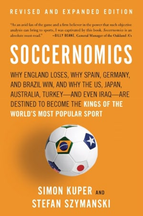
The interview starts with a discussion of how the legendary Bill James does not have a smart phone. It then moves to a discussion of the use of statistics in sport. A sizable part of the interview is devoted to an examination of Louis van Gaal's reign at Manchester United. The other large part of the interview involves Kuper discussing what we can expect from the next edition of Soccernomics.
When discussing the use of statistics in soccer, Kuper makes the point that soccer is drowning in a sea of statistics and that there is a need for some "mopping up". He says there is a need to determine what statistics are useful. Kuper recounts a discussion he had with Carlo Ancelotti where the Real Madrid boss pointed out that the statistics tended to focus on the 1 minute the player has the ball and ignore the 89 minutes the player is without the ball. It reminded me of the Maldini Principle discussed by Chris Anderson and David Sally in their book The Numbers Game. Anderson & Sally point out that if a defender is doing a good job then they will probably be required to do less tackling. Good positional sense reduces the need to tackle. Anderson & Sally say that Alex Ferguson admits that it was his incorrect intrepretation of the tackle statistics that lead to him allow Jaap Stam to leave Old Trafford.
In the interview Kuper says that Alex Ferguson's view on statistics will be included in the new edition of Soccernomics. There will also be new material on Financial Fair Play, the Brazil World Cup, and on the use of match statistics.
Kuper was asked what they might have got wrong in the earlier edition. In not so many words, Kuper says "nothing". He does say that some of the issues they raised in the earlier edition have now become mainstream. For example, he says people now accept that host countries do not benefit financially from major sporting events. There are not too many sports economists that would disagree.
The interview ended with Kuper being asked about his love of soccer and if it has changed. He admitted his love for club football has dimished because he has "looked behind the curtain". He says players and managers are in it for the money. However, he maintains a love for the representative game in the guise of the Netherlands national team. It is ironic that the economics of the situation seems to suggest that club is increasingly dominating country.
 RSS Feed
RSS Feed